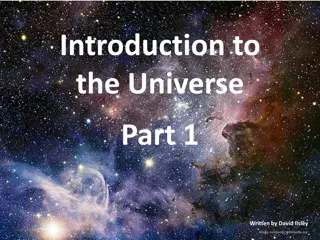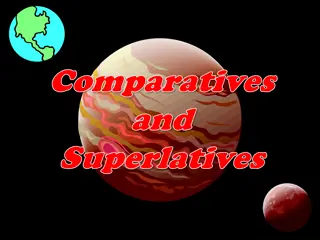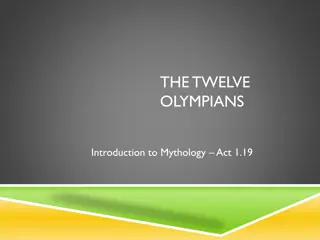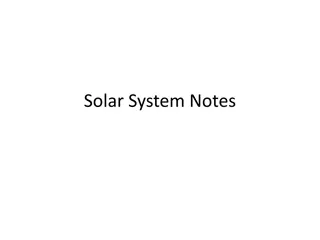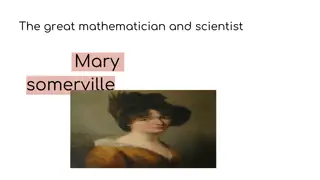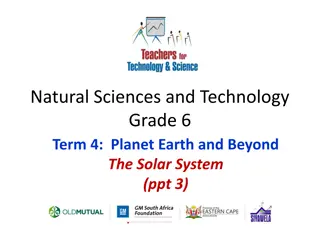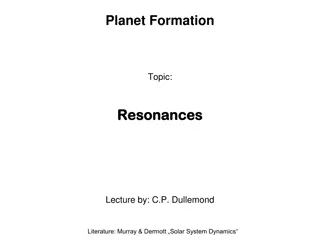The 8 Planets in Our Solar System and More
Discover the 8 planets in our solar system - Jupiter, Earth, Uranus, Mercury, Sun, Mars, Venus, Neptune - plus dwarf planet Pluto. Explore space-related words and images in this educational content.
11 views • 41 slides
[PDF⚡READ❤ONLINE] Neptune: The Planet, Rings, and Satellites
\"COPY LINK HERE ; https:\/\/getpdf.readbooks.link\/1852332166\n\nRead ebook [PDF] Neptune: The Planet, Rings, and Satellites | Neptune: The Planet, Rings, and Satellites\n\"\n
0 views • 6 slides
An Exploration of the Vast Universe - Part 1
Delve into the intriguing magnitudes of celestial bodies and distances within our solar system, from the massive scale of the Sun to the minute size of Neptune in relation to the Earth. Discover the diversity of stars, planets, and dwarf bodies that populate our cosmic neighborhood, showcasing the i
3 views • 48 slides
Fun Facts About the Solar System and Planets
Explore interesting comparisons between celestial bodies in our Solar System. Images and descriptions highlight the size, temperature, distance, and other unique characteristics of planets like Jupiter, Mars, Earth, Saturn, Neptune, Mercury, Venus, and more. Learn fascinating facts about these cosmi
0 views • 12 slides
Exploring Solar System Planets and Market Trends
Discover interesting facts about planets in our solar system alongside market trends analysis. Learn about the sizes, positions, and unique features of Mercury, Saturn, Neptune, Jupiter, Venus, and more. Follow along with engaging visual charts and comparisons. Dive into competition analysis, break-
0 views • 7 slides
Neptune Parts List and Pricing Details
This detailed content provides part lists and pricing information for SmaK Neptune 500H and Neptune 1200 models. It includes descriptions, part numbers, quantities, and prices for various components like hoses, tanks, cords, and more. The content is structured with clear sections for easy reference
0 views • 11 slides
Introduction to the Twelve Olympians in Greek and Roman Mythology
Explore the major gods from Greek and Roman mythology - Zeus (Jupiter/Jove), Poseidon (Neptune), and Hades (Pluto). Learn about their roles, stories, and unique attributes as powerful figures in ancient lore.
0 views • 20 slides
Explore Our Solar System: Planets, Moons, and More
Delve into the wonders of our solar system, from Mercury, the closest planet to the Sun, to Jupiter, the largest planet with its multitude of moons. Learn fascinating facts about each planet's unique characteristics, including their distances from the Sun, lengths of days and years, and intriguing f
0 views • 15 slides
Celebrating the Life of Mary Somerville: Polymath, Writer, and Scientist
Mary Somerville, a renowned Scottish scientist and polymath, was born on December 26, 1780, in Jedburgh, Scotland. She made significant contributions to various fields such as astronomy, mathematics, and writing. Despite facing challenges in her education as a child, she went on to achieve great suc
0 views • 5 slides
Exploring the Mysteries of Neptune
Neptune, the eighth planet in our solar system, is a fascinating icy giant with extreme weather conditions. Named after the Roman god of the sea, Neptune's deep blue hue and cold temperatures make it an intriguing celestial body. With its strong gravity and icy composition, Neptune presents unique c
0 views • 15 slides
Exploring the Outer Planets of the Solar System in Grade 6 Science
Discover fascinating details about Jupiter, Saturn, Uranus, and Neptune - the gas giants of our solar system. Learn about their unique characteristics, moons, rings, and distance from the Sun, providing a comprehensive understanding of these distant celestial bodies. Engage with educational resource
0 views • 16 slides
Understanding Resonances in Planet Formation
Resonances play a crucial role in planetary systems, where characteristic frequencies align to produce dynamical consequences. Mean motion resonances, spin-orbit resonances, and secular resonances are key examples influencing planetary dynamics. Explore resonant angles, resonant arguments, and examp
0 views • 17 slides
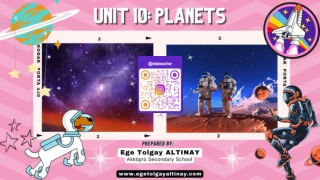
![[PDF⚡READ❤ONLINE] Neptune: The Planet, Rings, and Satellites](/thumb/21522/pdf-read-online-neptune-the-planet-rings-and-satellites.jpg)
